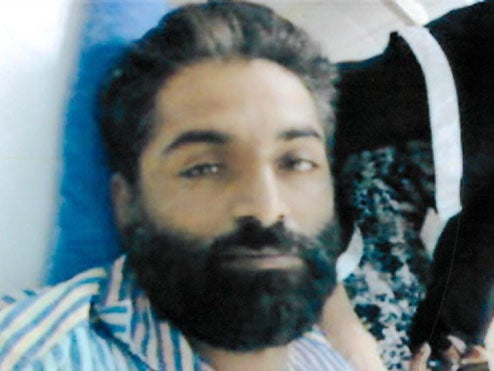Abdul Basit: Pakistan postpones execution of disabled man because he couldn't stand up at the gallows
Abdul Basit was due to be hanged on Tuesday morning

Your support helps us to tell the story
From reproductive rights to climate change to Big Tech, The Independent is on the ground when the story is developing. Whether it's investigating the financials of Elon Musk's pro-Trump PAC or producing our latest documentary, 'The A Word', which shines a light on the American women fighting for reproductive rights, we know how important it is to parse out the facts from the messaging.
At such a critical moment in US history, we need reporters on the ground. Your donation allows us to keep sending journalists to speak to both sides of the story.
The Independent is trusted by Americans across the entire political spectrum. And unlike many other quality news outlets, we choose not to lock Americans out of our reporting and analysis with paywalls. We believe quality journalism should be available to everyone, paid for by those who can afford it.
Your support makes all the difference.Pakistani jail authorities postponed executing a prisoner who is in a wheelchair an hour before he was due to be hanged because prison rules did not make it clear how they should proceed, his lawyers said.
Abdul Basit was to have been hanged in the eastern city of Faisalabad on Tuesday morning, but authorities were stymied at the last minute because he could not walk to the gallows as required by the jail manual.
"When the judicial magistrate came to the hanging, these guys tried to make him (Basit) stand at the gallows ... it wasn't possible, so the magistrate postponed the hanging," said Wassam Waheed, a spokesman for legal aid group Justice Project Pakistan.
On Monday, the Supreme Court upheld the death sentence against Basit, but only if it could be carried out in line with jail rules.
Basit became paralysed in prison after he contracted meningitis there and was not properly treated, Waheed said.
Basit's case is the latest in a series of high-profile hangings that have shone a spotlight on Pakistan's crumbling justice system and its reintroduction of the death penalty.
The nation brought it back in December as a way to tackle militancy after Taliban gunmen massacred more than 130 pupils at an army-run school.
Since then, 239 people have been hanged, although few have any links to militancy. Most, like Basit, were convicted of murder. Many of their families say they were falsely accused and too poor to get good lawyers or pay bribes.
Pakistani police rarely use evidence in cases, preferring to rely on oral testimony, which is easily manipulated. Rights groups say torture in custody is commonplace and lawyers say poor defendants must rely on court-appointed lawyers who may skip most of their hearings.
Basit, 43, was convicted six years ago of murdering the uncle of a woman he was having a relationship with. He denies the charges and his family allege his lawyer took money from his accusers.
Reuters
Join our commenting forum
Join thought-provoking conversations, follow other Independent readers and see their replies
Comments